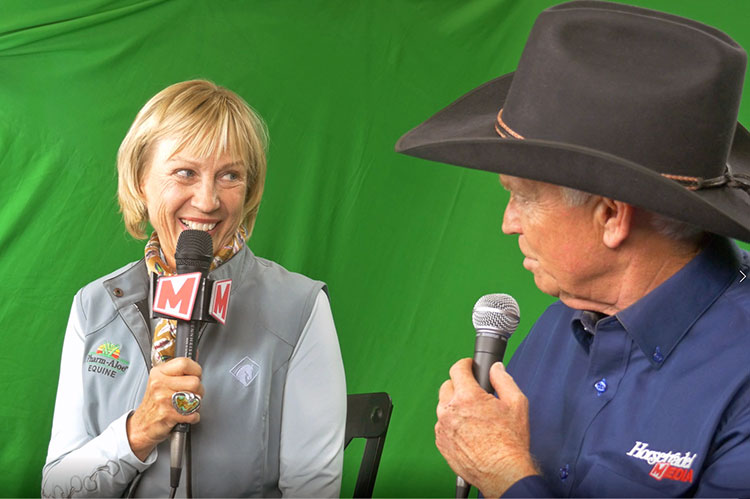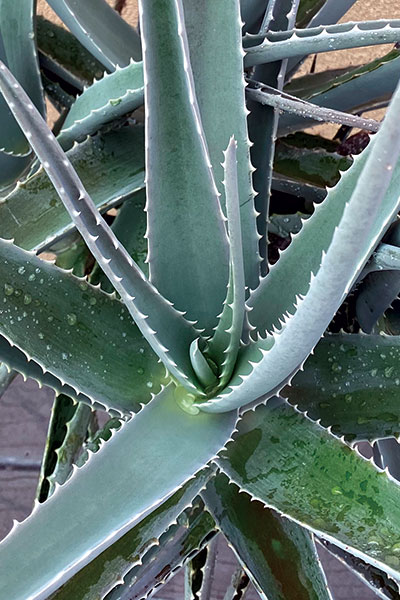
HT: Debra, why would I give aloe to my horse?
DEBRA: Well, if you love your horse, you want your horse to be at its very best—and at its healthiest. I got into Pharm-Aloe Equine because my little mare showed up with ulcer symptoms one day. I knew about aloe vera because my dad started the aloe vera business in 1971, so we have had a long history of aloe vera use for our horses and for people.
HT: I can imagine what was talked about at the dinner table all those years.
DEBRA: Many miracle stories, I can tell you that for sure. We have seen a lot of just wonderful effects and results from using aloe.
HT: So, your little mare had ulcers…
DEBRA: She had ulcer symptoms. I didn’t scope her, but she had the classic symptoms, and she was very reactive to me, especially on her right side. If I approached her on the right and touched her along the rib cage, she would try to bite me and move away from me. If I hadn’t read a book by Dr. Madalyn Ward on horses and natural ways of horse keeping, I wouldn’t have realized that she wasn’t just misbehaving. I would have thought it was just her being ornery.
HT: Some people might have thought “oh, she’s just being a mare… that’s mare-ish.” But she was truly giving the signs that she was in distress.
DEBRA: She was talking to me, yes. Even touching her, the slightest amount on the right side. So I called my father, the aloe vera expert, and asked, “when you did that research study with the University of Wisconsin for dairy cows—that’s a 1,000-lb. animal, and a horse is about a 1,000-lb. animal—how much would I give her?” I had heard people using aloe on their ulcers with great results. He said, give her two ounces of the concentrate. I took a bucket of oats and I poured the aloe vera concentrate over that, and she just ate it up. She loved it. I thought she really loves the taste of aloe, just by itself.

HT: What does it look like, and how does it pour?
DEBRA: It is very liquid—a little more viscous than water. But it’s very watery. I poured two ounces over about a cup and a half of oats, and just feed it to her like that. She just ate it up. In about four days, I saw a huge change in her demeanor. She wasn’t trying to kick me anymore. She started to get a shinier coat. I videotaped this every other day to watch the progress to see if this really was working or not. Was this a real thing that was happening to her, or was I imagining it? I had the proof in the video, and she just got better and better every day. In four days, she had a shiny coat, too. It was the only side effect, besides getting rid of the trying to fight me and to kick me.
HT: So, being the daughter of the inventor, the creator of this company… it took you all these years for you to really believe him that the product really worked with your horses?
DEBRA: (laughing) Well, no… because as kids, if we ever complained about a tummy ache, guess what we got? “Here… take some aloe!” I can promise you in five or 10 minutes that tummy ache was gone. It does the same thing for our horses.
HT: I can tell you have a passion for horses. What was it that prompted you and the company to take this product into the horse industry?
DEBRA: Thank you—that is really a great question because we’ve been doing this business since 1971, but it’s really been geared toward people. So, after my mare was helped so much with her ulcer issues, I shared it with a friend of mine whose horses suffered from a poisoning incident. The aloe vera was able to get them through that, and then another friend used it for something else. My dad approached me and asked, “Wouldn’t you like to have a business selling aloe for horses?”
HT: When did you decide to become the horse expert in aloe vera?
DEBRA: It was in 2016 that we decided that we were really going to do this.
HT: The product itself has been proven for a while.
DEBRA: Yes, about 5,000 years it’s been used. You know, if something doesn’t work, people usually will move on to something else. But this is a product that has been used around the world, the most amazing product. I’m really passionate about sharing that with everyone.
HT: I know friends of mine who have the aloe plant in their backyard, and when something happens, they go out and cut a leaf off. What you have done is make it easier and more consumable than just going out in the yard and cutting off a leaf, and then trying to feed it—in this particular case—to the horse.
DEBRA: Yes, we make it very convenient, because you would use up your plants, too—the plants are beautiful growing on their own. It is convenient, it’s ready for you, and it’s a very high potency. Our product has been tested by independent laboratories for 23 years now.
HT: Do I wait for something happen to my horse to fix something or do I give this supplement to my horse before something happens that will help them along—perhaps prevent something.
DEBRA: You know what they say, an ounce of prevention is worth a pound of cure.
HT: And a lot of money at the vet hospital.
DEBRA: You can give—and you should give—aloe to your horse every day. You should take it every day. I take it every day, and I give it to my horses every day for that reason. Our studies with the University of Wisconsin was really based on immune support and enhancing the immune system. And nothing beats a good immune system when we need that.
HT: So, by taking this, whether it be horse, human, dog or whatever, you can boost the immune system.
DEBRA: Well, aloe vera works on a cellular level. It is really at the very essence of life on the cellular level. It’s not a symptomatic approach or a band aid approach to fixing a particular ailment or a disease. What aloe does is it really supports the body in healing itself. There are huge amounts of Acemannan, a mannose polysaccharide that is in copious amounts in aloe vera. Nothing on this planet has as much of that mannose polysaccharide as aloe.
When we supply our cells with aloe vera and mannose, our body will really take care of healing itself. Our body is really meant to be in a state of health and wellness and operating at its optimal. If the cellular communication is correct, we are going to be in a healthy state.
So, prevention is important, and you can take this every day to support your GI system—so much happens in the gut. It is so important. It’s critical even to our mental processes. Dopamine and serotonin start in our gut, and it affects the brain and our thinking. How we are feeling? Are we happy, in harmony? Things going well?
GI health is so important, so aloe vera will support your GI system, support the horse’s GI system, enhance the immune system, give the inflammatory response process the support that it needs so it addresses inflammation, often the cause of disease.
HT: Inflammation is one of the biggest problems in both humans and animals, and the way we ride our horses—we put them through a lot in a lot of disciplines and they end up with a lot of pain and inflammation. So, you are telling me that if I give this to my horses and dog, and if I take this along with my animals in the prescribed amounts, that it will help me from the gut to the immune system—not only for myself, but for the horses, too.
Will it grow more hair on my head?
DEBRA: Well, you will have to give it a try—and let us know. We do have before-and-after pictures of mane and tail growth. People have reported great results with that.
MORE ONLINE: Additional information on Pharm-Aloe Equine and the line-up of available equine products is available on the company website, PharmAloe.com.
EDITOR’S NOTE: This interview by John DeBevoise for Horsetrader Media was one of 19 in the live Horsetrader Media Studio during three days of the Western States Horse Expo Pomona last November. For additional information on Horsetrader Media, send us an email to: contact@horsetradermedia.com. We’d love to share our new media products!
Leave a Comment
All fields must be filled in to leave a message.